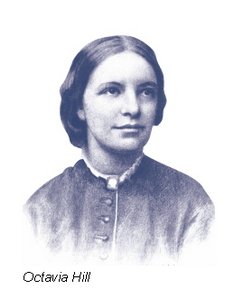
Social reformer and co-founder of the National Trust.Octavia had a vision and a belief, alongside energy, commitment and resolve; a socially inclusive society for ever for everyone. Good housing, recreational open spaces and education for all.
Remembered mostly for the National Trust, her real vision was as a campaigner for improvements to people’s lives and to broaden horizons through enabling all to have access to open spaces and a better quality of life.
Born in December 1838 in Wisbech, to a family where her mother was very instrumental in the formation of Octavia’s beliefs, she was part of a large family, five sisters from her mother and father, and six children from her father’s previous marriage.
Her father owned a bank which in 1825 was closed and her father became bankrupt, It was during a time of a national banking crisis.
Memories of Mary Poppins!
Her maternal grandfather Dr Thomas Southwood Smith was a champion of rights for the poor and involved in preventing the unsanitary conditions in the slums of London.
In 1848 The Christian Socialists developed and Octavia became involved and was confirmed in 1857. Her faith was profound and enduring, action not words were her expression of her belief.
She became involved with John Ruskin, a social and education reformer, between them they worked to ensure that ‘the poor’ had access to housing, food and sanitation. This was the time of the Poor Laws, the workhouses and soup kitchens.
There are a number of parallels between life then and now, and there is much evidence of the work of Octavia Hill especially in London.
To read more, go to Easter 3rd Sunday on faithgoeswalkabout or through the Octavia Hill website.
Rev’d Sue Martin
Curate in Gayton Group of parishes
